Like politics, the entertainment industry is filled with monstrous egos awash in a sea of dysfunctional behavior. Earlier this year, I locked horns with a local talent who had co-produced, co-directed, and co-written an adaptation for which he designed and built the scenery, appeared onstage in a critical role and, following the performance, informed the audience that his production had gone way over budget as he begged for additional donations.
When my review appeared, it contained some text which did not please him one bit. In a terse email exchange, he simultaneously asked me to delete the comments he found offensive, accused me of being unsympathetic to the needs of the local theatre community, and informed me that I was being most unprofessional as a critic. Several months later karma struck back as his uncontrollable ego and total lack of professionalism provoked a crisis that cost him dearly.
Why was I not surprised? In order to pursue their creative dreams many artists are forced to think outside the box, bend the rules, test the limits of a signed contract, and perform outrageous acts of rationalization that would challenge a professional contortionist. Whether filming on the fly or hoping that their little fantasy can fly below the radar, they willingly take some clearly identifiable risks for the sake of their art.
Others grant themselves permission to create certain pieces of art when, in truth, their talent may be much smaller than they are willing to acknowledge. The following video clip spoofs the phenomenon quite accurately:
* * * * * * * * * *
Josh Freed's appallingly egocentric movie, Five Weddings and a Felony, is the kind of narrative film masquerading as a comic documentary that doesn't deserve to be showcased in a bedpan, much less a film festival. Five Weddings and a Felony begins with fuzzy footage from Freed's bar mitzvah in Chicago, discussions of his obsession with Louis Malle's film, My Dinner With André, and consists primarily of Flip video interviews with current and ex girlfriends (as well as his mother) who "share" their feelings about the filmmaker. According to the film's website:
"Five Weddings and a Felony is a nonfiction, mumblecore romantic comedy. Overeducated, underemployed 20-something Josh Freed took his little Flip camera to the front line of modern courtship -- his bedroom -- bumbling and mumbling as he attempts to get laid and grow up. The film is an anthropological journey inside the courtship rituals of many 20-somethings today, and a meditation on one of the world's great questions: Why are women -- God's most lovely, loving, wonderful creations -- so attracted to lumbering, self-defeating brutes? Five Weddings and a Felony will appeal to any woman who's ever loved a confused man-child, and any man who's ever been terrified by the idea of marriage. And that's pretty much everyone."
There's a term for that kind of writing. It's called "bullshit publicity designed to make narcissistic drek sound important." Rather than being self-referential, Freed's film comes off as a new form of mental masturbation (extended family style) which, if the filmmaker had any control over his ego, would be horribly embarrassing. But in his director's statement, Freed explains that:
"I began making the film that became Five Weddings and a Felony when I was 24 as a courtship strategy to win over a woman I felt unworthy of, with no idea what I was doing, hoping just the fact that I was doing it would impress her. It (the film) was abandoned several times as I fled relationships I was afraid to commit to, but I kept returning to it because the women in my life just seemed so screenworthy to me, and I hoped the footage might illuminate the mystery of why such beautiful creatures would ever be attracted to me. It didn't. It shall remain a mystery. But over the four years it took to finish it, the film came to represent for me my slow march toward adulthood (as if only a complete document of all my selfish behaviors and irrational fears would allow me to move beyond them).
Though the film is full of my own idiosyncrasies, it also reflects a trend among my generation (you may say I'm messed up, but I'm not the only one). Some researchers and psychologists want to codify a new life stage between adolescence and adulthood, called 'emerging adulthood,' because we 20-somethings are taking our sweet time getting to those milestones -- financial independence, marriage, children -- that our parents achieved at 23, 24, 25.
Emerging adulthood is marked, according to a recent New York Times Magazine article, by 'identity exploration, instability, self-focus, feeling in between and... a sense of possibilities.' And there are so many possibilities: for those of us whose parents are liberals from the 1960s -- they encourage us to explore, find ourselves, try different relationships. Premarital sex and cohabitation are so widely accepted we don't feel much pressure to get married. Even though the economy collapsed and we fear we'll never have job stability, we know that the world is changing faster than it ever has before, which means more potential for exciting achievements (or devastating failures). At its heart, Five Weddings is a journey into modern courtship, with the unique intimacy afforded by the tiny Flip camera."
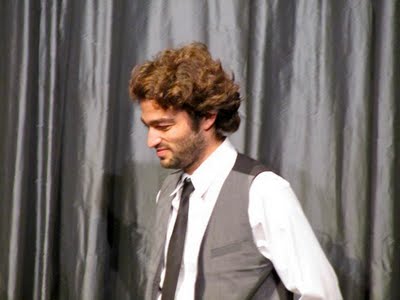
Filmmaker Josh Freed
One of the first suggestions given to aspiring filmmakers and writers is to "write what you know." While self knowledge can be a wonderful thing, some people are not particularly interesting. Aside from its derivative title, Five Weddings and a Felony is such a painfully boring and execrably self-serving exercise that it swiftly brings to mind the following lyric from Kander & Ebb's 1975 musical, Chicago :
"Give 'em the old razzle dazzle
Razzle dazzle 'em
Show 'em the first rate sorcerer you are.
Long as you keep 'em way off balance
How can they spot you've got no talent
Razzle dazzle 'em
And they'll never catch wise!
What if your hinges all are rusting?
What if, in fact, you're just disgusting?
Razzle dazzle 'em
And they'll never catch wise!"
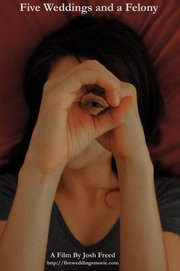
Poster art for Five Weddings and a Felony
The bottom line? Just because you own a Flip camera and can hold it in your hands doesn't mean your own personal story is screenworthy or that you have anything to say. Nor does it mean you have enough talent to call yourself a filmmaker. Contrary to what you and your mother might believe, you're not that interesting. Nor are your attempts to date women.
The true test of Mr. Freed's minimal talent will be if he has another film in him. The final words the audience hears as the credits for Five Weddings and a Felony start to roll are a self-congratulatory "And, oh yeah, I finally finished my film!" For most viewers, that statement will pretty much sum up what it felt like to have wasted 75 minutes of their lives. Here's the trailer:
* * * * * * * * * *
What happens when a successful filmmaker produces a work whose drearily selfish, self-indulgent, and self-deluded characters elicit absolutely no sympathy from the audience? You get a cinematic lead balloon like media darling Miranda July's film entitled The Future.
Written by, directed by, and co-starring Ms. July (who made a very positive impression with 2005's Me and You and Everyone We Know), The Future is nothing less than a big, fucking pretentious bore attempting to masquerade as 90 minutes of art. The film's tiny cast of characters includes:
- Jason (Hamish Linklater), a man in his mid-30s whose job as a tech support consultant allows him to work from home.
- Sophie (Miranda July), his girlfriend whose career as a dance artist is going nowhere.
- Marshall (David Warshofsky), a selfish 50-year-old man that Sophie meets through a classified ad.
- Paw-Paw, a cat (symbolizing commitment) that Jason and Sophie are hoping to adopt from an animal shelter.
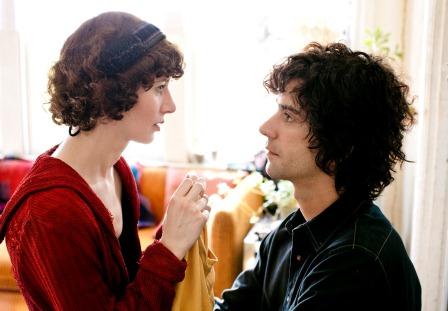
Sophie (Miranda July) and Jason (Hamish Linklater) in The Future
Miranda July has already proven that she has skill as a filmmaker. Her shots are beautifully set up and filmed with a knowing eye. She can capture brief moments of wistfulness with astonishing clarity. And yet, The Future is another film whose deepest impression on viewers will be that they've just lost 90 minutes of their lives that they can never get back. In her director's statement, the filmmaker writes:
"It seemed to me, a woman in her thirties, that time had suddenly become the protagonist of my life; I was stunned by a new awareness of mortality, of life being finite. I suppose this marks the beginning of adulthood. Or, if you are not quite ready for adulthood, it marks the beginning of a problem. Jason responds to this predicament like an artist should: he isn't making anything, but his decision to be led by mistakes and coincidences is the creative process. He's not without doubt, but he keeps his faith, which leads him somewhere new. I wanted to show the side of creativity that is spiritual, even a bit mystical, and more about surviving life than about performance or production.
Meanwhile, with no less determination, my character, Sophie, attempts to create a YouTube dance -- this is the other end of creativity, the entirely goal-oriented desire for attention. I try to keep that craving in my blind spot, and go about life as Jason does. This was easier ten years ago, when wanting attention was still shameful, and getting it was hard for most of us. The Internet has both exposed and created a more acute awareness of our need to be reacted to. You only have to unplug it and bam -- you are in a profound crisis, facing the empty void without distractions. As a writer, I have to make my way through this crisis on a daily basis. But what if I couldn't? It would be like a horror movie. I would be so disappointed in myself that I would literally break up with myself, and then (because this is a fantasy) I would be completely taken care of, like a child. This would take place in a very clean house in the suburbs; a house with nice sheets. But there are two big flaws in this fantasy: 1) I would have to leave my soul mate. And 2) no one would have time to watch me every second. And it would really have to be every second, because I know that if I had even a moment alone, my true self would haunt me, and this would be a nightmare. It was very painful to act all of this out. And even if you flee your life, I think you still end up in the same place in the end. You still have to be you, you still have to make the dance. It's just much harder, and some important things are lost along the way."
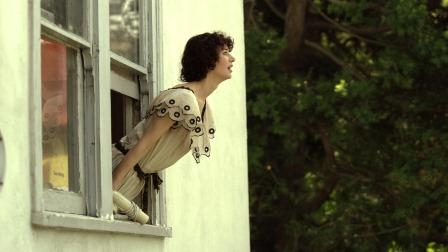
Miranda July in The Future
Hamish Linklater has always impressed me as an actor. In The Future:
- The fact that these two directionless souls can hold down jobs means that they barely qualify as slackers.
- The fact that Sophie's vision is so limited means that she barely qualifies as an artist.
- The fact that The Future boasts some interesting visuals but is such a monumental waste of time means that it barely qualifies as a film worthy of an audience's attention.
In a recent blog post about little girls who make videos of themselves dancing, Ms. July wrote: "I know I was bored and wanted attention the first time I turned on the camera. But now the camera is always on, and the audience is always there. For me, an audience seems to promise a kind of deliverance that never comes. And I love to wait, believing that it still might, one day."
Most viewers watch a film in the hope of experiencing some kind of deliverance, but that deliverance never comes in The Future. Nor will many viewers find the waiting worthwhile. Try to imagine a Todd Solondz film with no interesting characters, no dramatic tension, and no reason to be screened. Here's the trailer:
* * * * * * * * * *
Take all the cluelessness, lack of ambition, and fear of commitment depicted in the previous two films, turn them upside down, and you get a glimpse of what's possible when an obsessive narcissist can focus her energy on a clear set of goals. Filmmakers like Freed (who is in his mid-twenties) and July (who is in her mid-thirties) might be fascinated by the latest effort from Errol Morris (who is now in his mid-sixties). In addition to making films like 1991's A Brief History of Time and 2003's The Fog of War: Eleven Lessons from the Life of Robert S. McNamara, Morris is also the inventor of the Interrotron, a device his wife described as combining the elements of terror and an interview.
Tabloid traces the wild and wacky life of Joyce McKinney, the former beauty queen who became the darling of the British tabloids. In the following interview (conducted prior to the film's premiere at the 2010 Toronto International Film Festival), Morris explains how the Interrotron works and talks about what makes McKinney such a captivating documentary subject:
Morris initially came across McKinney's name in an article about pet cloning. But when he learned that she was also involved in a 1977 sex scandal involving Mormon missionary Kirk Anderson (who claimed he had been kidnapped in England, taken to a cottage where he was chained to a bed, seduced, and raped by McKinney), he knew there was a bigger story to investigate.
Long before the term "media whore" was invented, long before people like Paris Hilton, Britney Spears, and Lindsay Lohan were being chased down by paparazzi, Joyce McKinney had fallen in love with much more than a mere man. She had fallen in love with her own publicity and was smart enough to learn how to manipulate the media to her advantage (very few people travel with suitcases filled with news clippings about themselves).
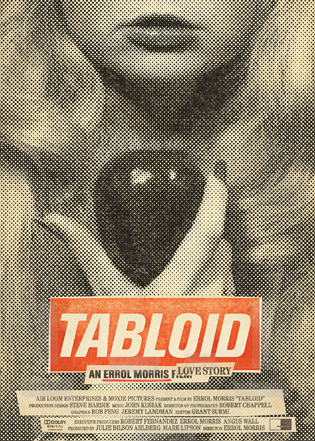
Poster art for Tabloid
In his director's statement, Morris explains that:
"Back in high school, Joyce McKinney read a short story by Theodore Dreiser entitled 'The Second Choice.' In Dreiser's story the young woman asks: 'Should I wait for the man of my dreams or should I marry the man who loves me?' A conundrum posed by countless young women, but Joyce McKinney wasn't just any young women -- she was a beauty pageant queen with an IQ of 168. She didn't want just any guy. She wanted a special guy. And so she did what any normal American girl would do -- she went after him.
Tabloid is a return to my favorite genre -- sick, sad and funny. It is a meditation on how we are shaped by the media and even more powerfully, by ourselves -- by the narratives we construct in our minds that may or may not have anything to do with reality. As a young woman, Joyce made a decision never to settle, to find true love at any cost, and that's what makes her an enduring romantic heroine. She's bound up in a dreamscape that she has created for herself, and very little can penetrate that protective bubble. In a sense, Joyce has always been living in a movie, long before she came to star in my film."
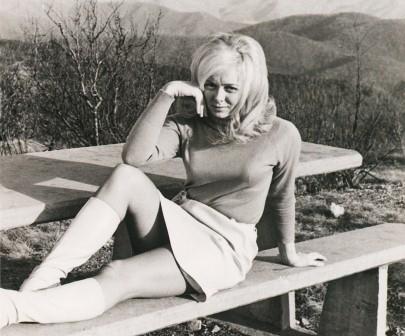
A vintage photo of Joyce McKinney (Courtesy of Errol Morris)
With the recent demise of News of the World (a British tabloid owned by Rupert Murdoch), it's interesting to recall that 35 years ago Joyce McKinney was rocking the British Isles in a scandal that involved a Mormon missionary in manacles, Joyce's history as a "model" for bondage scenes, and a host of other titillating factoids, such as Mormon apostate Troy Williams, who made a reference to McKinney and the concept of a "vagina dentata."
As bizarrely entertaining a documentary Tabloid may be for audiences (trust me, there are lots of laughs to be had while watching this film), my own personal experience with the movie was quite strange. I saw Tabloid with some friends during the 54th San Francisco International Film Festival. Seated close by was Joyce McKinney herself who, at various moments during the film, loudly stated to the people around her "That's not true. That's totally made up."
The tabloid press often tries to turn people into living legends. However, few people are as obsessed with their legacy -- or having so much fun living up to their legend -- as the one and only Joyce McKinney. Here's the trailer:
To read more of George Heymont go to My Cultural Landscape
